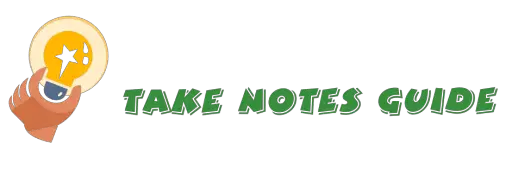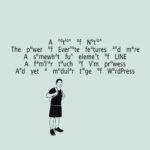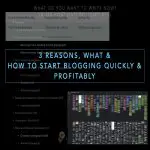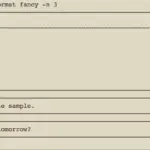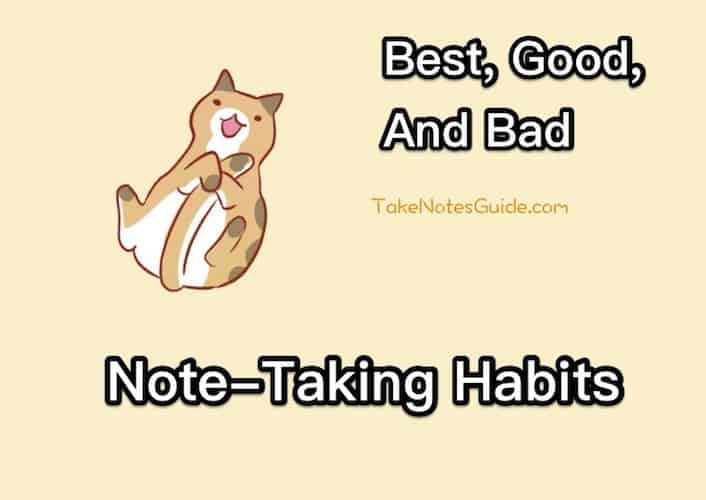
Wondering what note-taking or writing habits you can avoid and adopt to improve your productivity for the quality of work? Forming ingrained good habits can be crucial in the long run just as a top athlete performing well into his or her middle age with the muscle memory of refined motions. A fine habit can be the stepping stone to developing a good skill.
How to develop a note-taking habit?
- Habitual writing and note-taking method
What are the best, good and bad note-taking habits?
Best note-taking habits
- Discover yourself
- Creative
- Reviews and contemplation
Good note-taking habits
- Organised
- Neat and uncluttered style
Bad note-taking habits
- Not understanding and takes poor notes
- Not focusing on the main objective
- Easily distracted
- Overly reliant and attached to tools and secondary resources
Please reflect over each factor to determine which applies to you and decide if these points can improve your note-taking habits.
Habitual writing and note-taking method
The point is to write and take notes together. Write regularly. Keep writings and notes separate if possible. Take notes of your realizations and important points anytime during your writings. Write to engage your hand-eye coordination to help you focus, but understanding the subject-matter is the essence of taking notes of quality. Another way of perceiving is to pick a few from your best writings to put in points-style note format.
Also, the more you write or type the more it comes naturally. For example, when I take a break from a topic, I may write about another one that I wanted to instead without being stressed out. This is not a fixed formula, it also depends on your current conditions, inspirations and ideas that come. However, the more often you write as a habit the more you put yourself in a situation to benefit from writing more.
I do not really follow a strict regime of taking notes at a certain hour for the sake of noting, but I did notice better concentration after a good sleep and the following hours upon waking up, plus drinking a good cup of tea can enhance and prolong that period of concentration (I strongly recommend you reserve this particular time slot for your paramount matters). Perhaps a mixture of both discipline and your conditions (physical and mental) at that particular time will produce better quality of notes or writing.
Possible effective habit to develop in general:
- Start: Sit to study, research, take notes or write whenever you feel ready in the morning, relaxed, in a good mood or have good ideas coming up.
- Duration: Plan to write and take notes for as long as your inspiration lasts or with fixed intervals breaks i.e. 30-60 minutes.
- End: Study or work till you need to stop.
- Repeat routine the next day
Keeping a simple game plan as this may be more effective than an overly complex one.
Method example for a session:
- Drink your tea at 8 a.m and start writing daily or every other day if you can.
- Those who do not know what to write or type at the session start may pull out the book or material and start copying or transcribing, start understanding while getting used to the body physical movements of writing/typing.
- Wait for realizations and breakthrough in understanding before taking notes down in a separate notebook or note app. Transfer over pithy comments and ideas over as well.
- Personally, I would recommend first copy or take extra note of any examples for quick understanding before anything else. Think and figure out how and why the examples work. Go through the basics and explanations even if you can understand the examples to reinforce your learning experience. Remember to take notes of what you missed out, realized, and crucial ideas you wrote earlier separately.
Why does note-taking whilst writing work?
Writing or typing is the basis for all note-taking. When we focus on writing, we are essentially directing our attention to the task at hand. We become accustomed and then more skilled in writing as we seek to ameliorate our works and writings by distilling the information into the core essence in concise notes form. For example, the bullets notes in this post are taken in tandem with the writing.
Discover yourself
Find out your own habits to writing the most logical notes you can! Discover your comfortable style for taking critical notes. Everyone is different, so it is important to know how you work, remember this point if you can only take one. Capitalize on your existing habits with note-taking – this way you are working instead of fighting with yourself.
How do you take notes?
- On occasion?
- Everyday?
- Very intense for some days and then rest for a day?
- By pen or typing?
- How often do you reflect or contemplate a problem or topic?
- In the morning and what time?
- Do you like to write and take notes on the travel?
- What happens when distractions or obstacles happen?
- How often or much can you study or work or write or take notes a session or a day without losing focus?
- Do you research first before writing at one go or take notes while researching and building your content along the way?
I did not read about the effective habits of some highly successful people, but rather I urge you to focus on your own talent, disposition, situation, preference, style, character, training, past experiences, and background. Everyone is unique. I read of someone who actually wrote his book while traveling on a train. Respect the fact that ideas may come at different times and we may have to adjust accordingly to note them down but recognize also there is no need to crave at every single little detail.
Some people can do a lot more in a certain way or topic, but others may excel in another aspect e.g. maths genius vs geologist vs books reader & writer vs arm wrestler vs weightlifter vs marathoner vs python coders vs website designers vs developers. An expert in one may not be in another. Further, a person without any prompts or training may take days or several years to find his calling on what he should and want to focus on. We just have to keep working hard no matter what the obstacles.
Keep an observation page for your own note-taking proclivities. Most people just remember from experience what works for them. One may jot these experiences for reflection and reminder to further experiment how effective these conditions, methods, and ways can be when repeated.
For example, you observe that you spend a lot of time on your mobile phone, including listening to music on it. One way to turn it into your asset is to use your phone to cultivate a note-taking habit for any meetings and studies while playing your favorite songs. Or have a habit of taking notes whenever listening to songs that uplift your mood. For the creative minds, imaginative fictional association of your notes with gallery pictures and events when you feel inspired, and explore new apps that pushes you to take notes in ways you may not expect i.e. Take notes in a personalized Google map, a social media group or blog created for posting and sharing your class notes with comments for more interesting associations & difficult exercises & lessons learned from mock tests, tweeting your editable Evernote’s notes, a Zotero group for posting your research links & notes, fork & modify a Codepen to apply your notes ideas to a programming project, etc. By the way, this post is written on a mix of both desktop and mobile apps, so just explore and use what works for you.
Creative
There are a number of ways we can actually take notes, whether in its purposes, methods or apps.
For example, when we change our purpose of taking notes we also alter our perception and look out for different pertinent key information. Say a student studying a new subject paying attention to everything he does not understand as opposed to an experienced teacher scanning for superior understanding in materials and answer sheets.
Different Methods: A note-taker with a template of specific questions will take different notes from another who focuses on understanding examples then explanations or one who specializes in mind mapping for memorization.
Apps: There is any number of apps for taking notes. Apps can give a different vibe or feel and some are more powerful or beautifully designed. Basically, for any app you prefer, you should want to get one that saves your notes reliably on the web; No one likes losing notes that spent hours on, choose good apps such as Pure Writer and Evernote. Powerful note-taking apps such as Evernote premium can convert your emails into notes with the subject as title and email body as note content by forwarding it to Evernote.
In short, nurture a habit to be willing to explore new ways of taking notes. Technology evolves and so should we. Please read the posts on TakeNotesGuide for inspiration and tips.

Reviews and contemplation
Unless one has a photographic memory and perfect understanding, he should review the notes taken, even up to 4 to 5 times for exams. When we have a better understanding of the matter with frequent contemplation, we can speedily recall the information at will with practice which is particularly useful in certain time-restricted situations.
It is intriguing to observe that one may perceive a matter differently depending on the amount of time lapse before revisiting the notes. Our thoughts are ever-changing. And so can our purposes and intentions shift, and by then we may look for diversity or with a different angle. Experiment with various rest durations to test for different personal experiences. This is also part of discovering yourself, which may not always be obvious.
Contemplate your point in relation to other related ideas to understand it better. Is this idea flawless? Ask yourself how could you have applied this to other uses. What if you take this a step further where no one had? Perhaps research this more than anyone else in the class would? One might not master everything and mortals like us can’t anyway, but I believe you can be really good at something if you put your heart into it.
Good note-taking habits: Organised
Keeping organized is increasingly more important when there is so much information to process and learn in this millennial age. Like a public library classification system, we can apply our own individual catalog structure to keep track of information. Experts could be mind palace veterans. Modern note-takers can use notebooks and note tags (learn more in Beginner’s Guide To Taking Notes On Computer) in Evernote for future searches.
A web app worthy of mention for organizational prowess is Gingkoapp, free for basic use. Once you click a note, its related notes are highlighted to its right. I think this is an excellent implementation of an intuitively useful categorization system. This sensible breakdown of notes relationship makes reviews and notes additions easier in my opinion.
Both Evernote and Gingkoapp are different in overview layout but both are nonetheless robust in organizational capability. You could write notes in a Gingkoapp horizontal tree while copying them over to Evernote regularly as a backup.
Neat and uncluttered
Keeping your notes neat is definitely a good habit to cultivate, no one likes to read and search for messy and illegible notes that are randomly scattered all over. Neat notes inspire a more enjoyable note-taking experience.
How to take neat notes?
- Neat handwriting (Learn how to improve here) or type
- Keep your notes in bullets form
- Bold and sub-headings for clarity
- Short paragraphs for long notes
- Simple and succinct titles
- Consistent notes format across
- Start your notes with the a brief overview or the most significant ideas at the top
- A master note of a list of all your notes for each project (optional)
Bad note-taking habits: Not understanding and takes poor notes
I would think understanding in the right way (logical thinking) is the most important educational skill we can learn and develop over memory, creativity or others. Once we can critically and correctly analyze a topic, we develop the right understanding that enables us to take good notes and more. This is indispensable regardless of any subject or problem we encounter in life.
Train to understand by examining the causes and conditions in detail. Following that, infer what are the effects and could happen next.
One suggestion for people wishing to improve upon this aspect is to read Sherlock Holmes stories for his deductive and researching skills. It may be a fictional work but notice how the private detective provided detailed explanations for his conclusions, and meticulously planned his next moves to solve problems.
Not focusing on the main objective
Sometimes, we may stray away from the main focus and instead take interest in lesser matters. Make a habit to remind yourself and ask from time to time whether you are taking notes directly addressing the question or topic. Staying on point to the objective is, in fact, an essential habit that we must develop before we can write or take notes for an article that makes sense pertaining to a topic. For those who cannot focus perhaps reflect upon the reasons behind and address them appropriately first.
In brief, please do not write extraneously out of point.
For kids’ education, games that train critical thinking may help – please refer to Resources.
Easily distracted
When we take notes, stay on the task and do not let unimportant, external matters interrupt. Start a Pomodoro clock for timed sessions to keep track of your task time if you need one. Perhaps a minimalistic, dark background notepad such as TakeNotesGuide’s Notepad will filter out external distractions.
Another possible way to keep yourself going and ignore other distractions is by setting up a word counter finish line. For example, aim for notes of at least 100 words in not less than 10 valid points before you take a break for the day.
There are situations when we just have to take a break and come back later such as intense drowsiness, extreme physical or mental exhaustion or fatigue after a long session. Just remind yourself to continue where you left off once you are ready again.
Overly reliant and attached to tools and secondary resources
Heavy usage of a particular tool that you are comfortable and familiar with is fine, but being too attached to one or more resources to the point of unable to function and work when they are not available is not acceptable. We should train to take notes under different situations, even in challenging and stressful ones.
For example, some may use stencils and highlighters for keywords. Five to seven words is fine, but ten to twenty words are going to crowd and clutter. Can you still function if you forget to bring your these spare tools?
Notes are supposed to be effective with brevity, in my opinion. If there are too many points to take, keep it concise in a bullet form structure for clarity.
Conclusion
Actually, useful and effective note-taking habits should not be difficult to develop as long as you practice consistently and reflect critically over time on your progress: Do your notes make sense in relation to your topic and how to reach the next level?
Please put to good use the habitual writing and note-taking method spelled out above for your benefit. Once your start writing or typing, it is easier to turn some good ideas into notes. Think of it as progressive steps (writing sentences) to different milestones (notes). New habits will likely require discipline, efforts, and patience to develop, so plan what you can do each day according to your capability and adjust these steps when you learn more.
Do not sell yourself short on discovering and taking action for your habitual note-taking potential. Stay humble but keep going at bettering ourselves. Have some faith that you can write and take more good notes over time with effort.
For example, you may run out of ideas and mental stamina after a note-taking session, nonetheless, you do not give up and kept coming back after you have rested well to ignite your writing flame to add on your pile of notes until you may even have enough ideas for a book or series. I, too, struggle to write enough at times or simply have no ideas to go on, so I do understand the challenges you can face in writing. But I keep returning after my physical drain and mental exhaustion to append more in my note app. If you can take notes for a single page, why not a hundred or a thousand more? Moreover, we do have a choice to keep revising and updating our notes and writings if we find them unsatisfactory.
I hope this post can assist to pinpoint some areas that can forge a positive impact and inspire your note-taking habits and critical thinking endeavors. Good luck and be kind to others!
Related Questions
How to get a dark theme or background for writing or note-taking?
Short periods of typing may not matter much, but when spending months and years in front of electronic screens, we have to consider the radiation and our eyes health.
For mobile, Evernote dark theme and Pure Writer dark paper backgrounds For web apps, TakeNotesGuide Notepad and Writer labs.
All are free to use.
Are there any digital proofreading services?
Evernote on Mac OSX has built-in spelling and grammar checks with dictionary and thesaurus. For example, right-click the word for these options. You can even select British English, U.S. English, and other languages to check against for spelling and grammar. Also, Grammarly app can also perform grammar checks and more.

